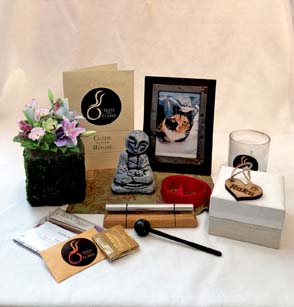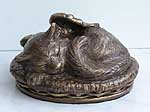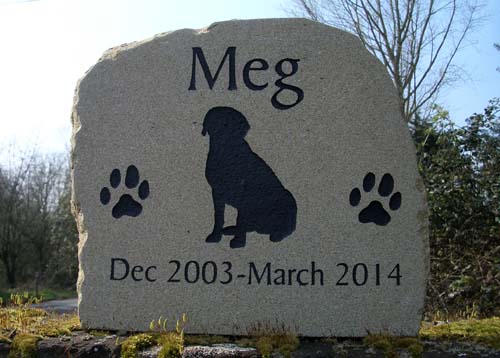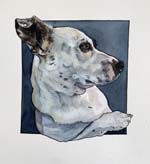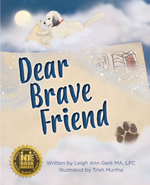See Moira Allen's recent video interview on pet loss!
Breaking the Power of Guilt
by Moira Anderson Allen, M.Ed.
If any emotion rules supreme when a pet dies, it is guilt. No matter what the circumstances of our loss, guilt is there, grabbing us by the throat. It haunts our days, ruins our sleep, and tarnishes our memories. Often, guilt goes beyond the loss itself; we may start to feel guilty for just about everything.
Guilt on the Rampage
If a pet dies through an accident or moment of carelessness, guilt is quick to follow. Perhaps someone wasn't careful about opening a door, and the pet ran into the street to be hit by a car. Perhaps someone fed the pet a hazardous treat -- a splintery bone or forbidden bit of chocolate. Perhaps someone overlooked a hazard -- an electric cord, or a bit of string. When something like this happens, guilt closes in quickly. If only I had known... If only I had been more careful... If only I had come home sooner... If only I had been watching... The final memories of the pet become a litany of failure.
If a pet dies of an unexpected illness, the litany is often similar. Why didn't I notice the symptoms sooner? Why didn't I visit the vet immediately? Why didn't I get a second opinion? How could I have let it go so long, been so blind, done so little?
Euthanasia is the grand master of guilt. No matter how certain we are that we are doing what is best for the pet, few pet owners actually feel comfortable with this decision. Very few can walk away from the vet's office without nagging doubts, without wondering what the pet felt or thought in that final moment, without asking whether we should have waited longer or tried harder. Many of us feel guilty of literally murdering a family member.
But even if there is nothing in the pet's final hours to trigger a guilty response, we are not off the hook. If we can't find something in the pet's death to feel guilty about, we'll find it in the pet's life. If only I had spent more time with her... If only I had given him more attention... If only I hadn't pushed her off my lap, if only I hadn't ignored those pleading eyes, if only I hadn't been so busy... Before long, we convince ourselves that we were abominable pet owners who made our companions' lives miserable. And now it's too late. We cannot make amends, redeem ourselves...
Why do we feel this way?
We are believers in cause and effect. When something goes wrong, we want to know why. How did it happen? What went wrong? Could it have been prevented -- and if so, how? Who is responsible? What could/should have been done differently? Rarely can we acknowledge that there are no answers to these questions. Rarely can we say, "no one was at fault; it simply happened." Rarely can we accept that nothing could have been changed or done differently.
This reaction is intensified by the profound sense of responsibility we feel toward our pets. Pets occupy a similar role to very small children: No matter what happens, we are responsible. We can never expect our pets to understand why they shouldn't run into the street, chew on the electric cord, or filch scraps from the trash. We are always their guardians and protectors. And so, when something happens, we view ourselves as responsible for that as well -- and it is only a short step from feeling "responsible" to feeling "guilty."
From Guilt to Redemption
A little bit of guilt, for the right reasons, can be healthy. Next time, we'll vaccinate; next time, we won't feed the pet bones or scraps. Next time, we'll consult the vet immediately about that odd behavior change.
A lot of guilt, however, is not so healthy. Left unchecked, it can prevent us from seeking the joy of a new pet -- and can even ruin our lives. I've spoken with pet owners who have suffered from guilt for years. So if you can't shake the sense of being "to blame" for your loss, you could be in for a long, rough ride -- unless you choose to change direction.
Notice that I said "choose." While we can't always control how we feel, we can control how to respond to those emotions. We can choose whether to control those emotions, or whether to allow them to control us.
Nor is guilt simply an emotion. At its core, guilt is a belief -- a conviction that we have done wrong and must suffer for it. The only way to break that conviction is to change what we choose to believe. Here are some choices that can help you take the upper hand over guilt.
1) Choose not to rehearse guilt. Do you find yourself repeating the same guilty thoughts over and over again? They won't go away by themselves. You must choose to make them stop. First, catch yourself. When you find yourself wandering down that painful mental path, put up a mental stop sign. You might choose a physical action, such as snapping your fingers, to remind yourself to change direction. Then, deliberately focus on something else, such as your plans for tomorrow. Focusing on something positive in the future is a conscious reminder that there is more to your life than negatives from the past.
2) Choose to accept what cannot be changed. A self-imposed "penance" for past mistakes accomplishes nothing. It doesn't change, or make up for, the past; it simply ruins your future. Chances are that you've already changed anything that needed to be changed (such as vaccinating your other pets). Can you change anything else? Can you undo what was done? Can you change the outcome of your actions? If the answer is "no," choose to accept that answer. Accept that the only thing you can change now is your future.
3) Choose balance. Guilt keeps us focused on the times we imagine we failed -- the times we were "too busy" to take a pet for a walk, or play with it, or cuddle it. It blinds us to all the other times when we weren't too busy. So the next time your mind drifts into those unhappy thoughts, choose to refocus. Actively remind yourself of the good times, the times when you were, indeed a responsible and caring pet owner. (Chances are, that was most of the time.) Flip through your photo albums. Write down a list of the things you did for and with your pet. Force yourself to remember what went right. Recognize that there is, and always has been, a balance between your failures and your successes. No, you weren't 100% perfect. But neither were you 100% flawed.
4) Choose forgiveness. Forgiveness is not some abstract religious concept. It is a rock-bottom necessity in any relationship. Think about it. Could you have had a relationship with your pet, if you couldn't "forgive" the puddles, the torn drapes, the gnawed belongings, the broken heirlooms? Pet owners who can't forgive don't remain pet owners for very long. And it worked the other way as well: How often did your pet "forgive" you for coming home late, or ignoring it, or yelling at it? Forgiveness has always been at the foundation of your relationship with your pet, and now you need to make it the foundation of your healing. Each time guilt tries to remind you of some past mistake, acknowledge that mistake -- and forgive it. If you did wrong, fine. It's done, it's over, and it's time to move forward. Treat yourself with the same degree of love and acceptance that your pet gave you. Only then will you be able to heal and love again.
Pet owners who "don't care" will never experience the pangs of guilt. Only caring, responsible pet owners go through this agony. The trouble is, too much guilt can prevent you from becoming a caring, responsible pet owner again.
The world has enough people who don't care what mistakes they make. It doesn't have enough pet owners who do care -- who choose to learn from their mistakes and move on to make a difference in yet another pet's life. Don't let guilt keep you locked in a lifetime of misery. Choose to forgive, to love, and to move forward. The world needs you!
Copyright © 2000 by Moira Allen. This article originally appeared on Allpets.com.
| Please visit our Handouts and Reprints page for information on distributing this information as a brochure or text handout. |
When a pet dies, you want help... fast!
You'll find it in Moira Allen's Coping with Sorrow on the Loss of Your Pet. In a book filled with comfort, compassion and support, you'll find the tools and tips you need to:
 |
- Understand the feelings you're going through -- and find ways to ease the pain
- "Say good-bye" with memorials, tributes and other coping strategies
- Help your children and other family members deal with their grief
- Deal with people who "just don't understand"
- Help surviving pets cope with the loss of a missing companion
- Come to terms with the guilt we so often feel when a pet dies
- Handle the agonizing decision of euthanasia
- Choose the best and most comforting "final resting place" for your pet
- Determine when and how to bring a new companion into your home (how soon is too soon?)
- Improve your chances of recovering a lost or stolen pet
- Help a friend cope with loss
|
Coping with Sorrow on the Loss of Your Pet celebrates over 30 years in print -
our expanded Third Edition is available from Amazon.com in Print and Kindle editions!*
*(Please note that these are affiliate links. As an Amazon Associate I earn from qualifying purchases.)
Quantity discounts are also available; please visit our Quantity Orders page for details.
|

 HOME ·
HANDOUTS ·
Links ·
Pet Loss Hotlines ·
List Your Organization ·
List Your Product
HOME ·
HANDOUTS ·
Links ·
Pet Loss Hotlines ·
List Your Organization ·
List Your Product